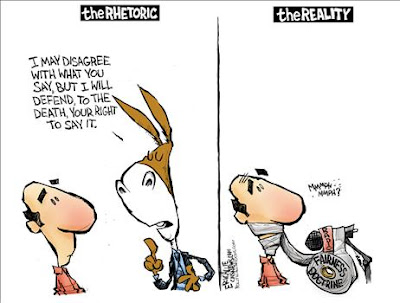




ATTACKS ON FREEDOM OF SPEECH AND PRESS
Whereas, the First Amendment of the U.S. Constitution clearly states: "Congress shall make no law respecting an establishment of religion, or prohibiting the free exercise thereof; or abridging the freedom of speech, or of the press; or the right of the people peaceably to assemble, and to petition the Government for a redress of grievances";
Whereas, members of Congress are recently on record saying they want to re-impose the so-called "Fairness Doctrine" on U.S. broadcasters, or else accomplish the same goal of censoring talk radio by other means, and thereby establish government and quasi-government watchdogs as the arbiters of "fairness" rather than the free and open marketplace of ideas;
Whereas, the U.S. experimented with the so-called "Fairness Doctrine" for 38 years - from 1949 through 1987 - during which time it was repeatedly used by presidents and other political leaders to muzzle dissent and criticism;
Whereas, the abandonment of the so-called "Fairness Doctrine" in 1987, thanks to President Ronald Reagan, resulted in an unprecedented explosion of new and diverse voices and political speech - starting with Rush Limbaugh - that revitalized the AM radio band and provided Americans with a multitude of alternative viewpoints;
Whereas, talk radio is one of the most crucial components of the free press in America, and is single-handedly responsible for informing tens of millions of Americans about what their government leaders are doing;
Whereas, it is a wholly un-American idea that government should be the watchdog of the press and a policeman of speech, as opposed to the uniquely American ideal of a free people and a free press being the vigilant watchdogs of government;
Whereas, the so-called "Fairness Doctrine" - either under that name, or using a new name and even more devious methods - represents a frontal assault on the First Amendment, and its re-imposition would constitute nothing more nor less than the crippling of America's robust, unfettered, free press:
SIGN THE PETITION at http://www.wnd.com/index.php?pageId=87882

